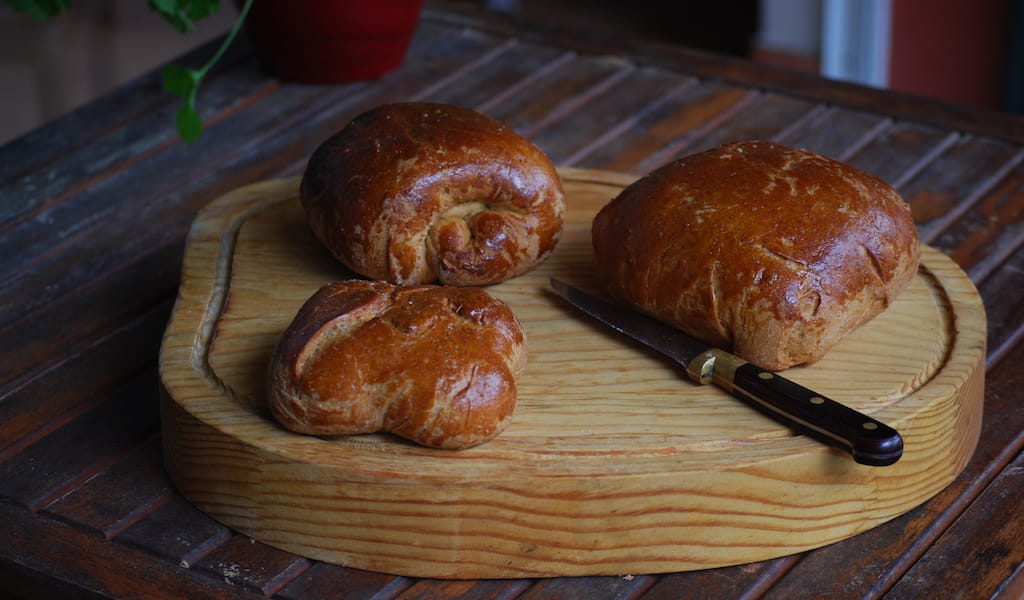Editor’s note: Unfortunately, due to a recent change in management and staff at Derlikatesen and a resulting decline in food quality, we are no longer able to recommend this venue. For souvlaki that has really withstood the test of time, check out the classic restaurants in our downtown souvlaki feature.
Don’t be fooled by the name: Derlikatesen does not stand for dirty and delicatessen, as online urban dictionaries would like you to think, but is a combination of “delicatessen” and the Greek slang verb ντερλικωνω (derlikono), meaning eating until one is ready to burst.
Back in the ’90s the stereotypical image of a souvlaki place was a neighborhood delivery joint with greasy gyros and plastic-looking French fries. That all changed in the early 2000s when tavernas and souvlaki places were finally modernized. New, fun, minimalist venues that didn’t look one bit like those old greasy diners appeared for the first time.
In 2006, Derlikatesen (until recently named Derlicious) opened with much fanfare on ritzy Tsakalof Street in Kolonaki. Traditionally Athens’ richest and classiest district, Kolonaki has managed to remain expensive and exclusive for many years. It is here that all the international fashion houses first opened shop, where old ladies walk their tiny dogs wearing diamond rings and scarlet red lipstick, and where tiny apartments used to be rented out at extortionate prices. All this has of course changed in the past few years, but Kolonaki still remains undeniably posh.
And so is Derlikatesen, at least in comparison to typical venues serving souvlaki. The inside is a tiny hallway, bright and nicely decorated with blackboards of different sizes on the walls describing what is on offer. The place is self-service, so you place your order at the cash register in the back and then move to the open-plan barbecue area in the front.
The classic Greek souvlaki is either a kalamaki (pieces of meat – usually pork or chicken – on a wooden skewer) or it is a kalamaki or portion of gyros with toppings, tightly wrapped in pita bread. The toppings can vary but the most typical are patates tiganites (the Greek version of French fries), tzatziki, tomato and lettuce. Derlikatesen does all this but with a twist. The first difference is in the pita, which is light and fluffy and has a pleasant flavor from the corn meal used to make it, setting it apart from the fluffy, white Middle Eastern-style pita used at most souvlaki places.

Derlikatesen also offers its own signature combinations, such as the dikavalo, two kalamakia stuffed into one pita for an extra meaty flavor. But our favorite is the traditional souvlaki wrapped in tortilla bread along with patates tiganites, which are served fresh, usually with crumbled feta cheese and oregano on top. When the spicy feta and oregano melt on a mountain of piping hot fried potato wedges, the result is a to-die-for moment.
Bizarrely enough, Derlikatesen is one of the few souvlaki places that offer great vegetarian and vegan options, such as a tasty roasted eggplant with a distinct smoky flavor, served with tomato and feta on top. They also do barbecued vegetables, such as mushrooms, on skewers. In addition, there is roasted halloumi cheese on skewers – this lovely, chewy, perfectly barbecued treat is highly recommended for anyone who’s never tried this cheese, a traditional food from the island of Cyprus.
This kind of creativity comes at a price, as Derlikatesen is an expensive place for a souvlaki (again, in relative terms). However, nobody seems to mind the prices, and the place is always packed. Tsakalof is pedestrianized, so everyone – grannies, families, kids, couples, fashionable young ladies in Louboutins – sits outside on the slightly cramped pale blue tables eating their “posh” souvlaki with a twist.
(Editor’s note: This review originally described a venue named Derlicious, which recently changed its name to Derlikatesen. The review has been updated; the venue is the same.)
 April 25, 2019 Meet the Vendors
April 25, 2019 Meet the Vendors
It’s 5:20 in the morning and while most lisboetas are still sleeping, Lurdes and […] Posted in Lisbon April 2, 2024 Grandma’s Folar Recipe
April 2, 2024 Grandma’s Folar Recipe
Folar is the generic name given to traditional Easter sweet bread in Portugal. Making it […] Posted in Lisbon May 6, 2015 CB on the Road
May 6, 2015 CB on the Road
From 6 a.m., Tuesdays through Sundays, over 500 customers – from housewives to […] Posted in Rio
Published on October 11, 2012
Related stories
Taste the very best seasonal seafood on our Song of the Sea walk!
April 25, 2019
LisbonIt’s 5:20 in the morning and while most lisboetas are still sleeping, Lurdes and Ermelinda Neves are already arriving at the Mercado da Ribeira in the Cais do Sodré neighborhood. Cooks and chefs from Lisbon’s restaurants start showing up at this central market at 6 a.m., and these two seafood sellers need to prep their…
April 2, 2024
LisbonFolar is the generic name given to traditional Easter sweet bread in Portugal. Making it from scratch is somewhat of a long process, but being confined due to the coronavirus crisis, we seem to have a bit more time on our hands than expected. My family’s folar recipe is from my grandmother Felismina, who was…
May 6, 2015
RioFrom 6 a.m., Tuesdays through Sundays, over 500 customers – from housewives to Michelin-starred restaurateurs – stream into a two-story, tile-front fish market in working-class Ponta d’Areia, a neighborhood in Niteroi, across Guanabara Bay from Rio de Janeiro. Since 2 a.m., stall owners have been out greeting fishing boats at docks across the city, where…

















































































